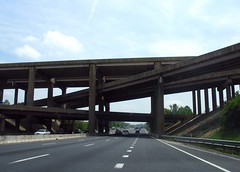End of starchitecture?
Flickr image, Baltimore - I-695 beneath I-70, by thisisbossi.
While I think not, there is no question that there isn't going to be so much money sloshing around the American economy that image over context and function will be all that affordable.
The architecture critic wrote about it in the Boston Globe a couple months ago, in "For architects, 'The Bilbao Decade' is over." Now, Blair Kamin, the Pulitzer Prize winning architecture writer for the Chicago Tribune, discusses the topic as well, in "Obama puts spotlight on nation's infrastructure."
Mr. Kamin discusses the debate that has occurred over the "stimulus" and the concern by many, especially those of us in the planning-transit blogospher, there what is happening right now is more of the same.
I think it's tough to expect "transformation" at the start of the Obama Administration. It might even be that the President Obama isn't as transformational as people's hopes and dreams made him out to be.
The one thing is that all the interest groups, especially the traditional groups, were prepared to lobby for their interests, and these interests all got rolled up into the stimulus bill.
What is clear is that the planning-compact development-transit-true sustainability organizations have to get just as organized, and clear, about the way forward. If that can be accomplished, and changes made in response to how the government is organized over the next 8 years, that would be a major accomplishment.
A counter example is the "Green Economy" stimulus proposal put forward by Canadian interest groups. See this op-ed "Canada needs a green stimulus plan" from the Toronto Star and this article from The Tyee, "In Canada, a Push for Obama-style Green Stimulus."
This reiterates the points made in this entry, about how "chance favors the prepared city (or interest group)":
-- How will Obama relate to the District?
-- "Chance" continues to favor the prepared road builders
I happened to write a bit about this today in email, here's my urban agenda for the Obama Administration...
Obama lived in a city, but he's more of a professor, and not nececessarily a transformational person yet, at least in terms of planning policy as it relates to land use, even if he's read Jane Jacobs.
In my opinion, the idea of the "Office of Urban Policy" looks at cities more in terms of poverty and poverty reduction, rather than cities as engines of knowledge and innovation (along the lines of Jacobs in Cities and the Wealth of Nations, + follow on work ranging from Richard Florida to the Brookings Institution).
1. That we need to redesign HUD and Ag, the first as a Dept. of Cities, Regions, and Sustainability, the latter as a Dept. of Ag., Rural Dev., and Sustainability, and merge certain functions such as EPA Smart Growth and DOE Smart Growth into HUD, etc.
2. That as in the same way that the Dept. of Commerce produced model legislation for Comprehensive Land Use Planning and for model Zoning regulations in the 1920s, the Federal Govt., in this case HUD, needs to produce national "Planning Policy Statements" comparable to those produced in the UK, to shape how local governments organize transportation and land use planning.
3. The first Planning Policy Statement should outline a linked land use and transportation planning paradigm. The second one should probably outline a framework for transportation planning at the national, regional, metropolitan, and local levels (along the lines of the transportation network planning framework that I espouse). The third probably on urban growth boundaries and compact development. Etc.
4. And US DOT and HUD funding should be reordered accordingly. Including transportation reauthorization, excise tax policy, etc.
5. Similar to how the States of Maryland (under Gov. Glendening) and Massachusetts (under Gov. Romney) provided incentives to local jurisdictions to move towards smart growth planning and affordable housing production.
If we could achieve this kind of agenda in 8 years of an Obama Adminstration, we would be well served.
Labels: progressive urban political agenda, sustainable land use and resource planning




0 Comments:
Post a Comment
<< Home